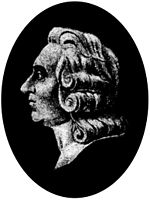
Back أكسل فريدريك كرونستيد Arabic اكسل فريدريك كرونستيد ARZ اکسل بردریک کرونستد AZB Аксель Кронштэт Byelorussian Axel Fredrik Cronstedt Catalan Axel Fredrik Cronstedt Czech Axel Fredrik Cronstedt Danish Axel Frederic Cronstedt German Axel Fredrik Cronstedt Esperanto Axel Fredrik Cronstedt Spanish
Axel Fredrik Cronstedt | |
|---|---|
 Axel Fredrik Cronstedt | |
| Born | 23 December 1722 |
| Died | 19 August 1765 (aged 42) |
| Nationality | Swedish |
| Known for | nickel tungsten |
| Scientific career | |
| Fields | chemistry Mineralogy |
Baron Axel Fredrik Cronstedt (/kroonstet/ 23 December 1722 – 19 August 1765) was a Swedish mineralogist and chemist who discovered the element nickel in 1751[3][4][5] as a mining expert with the Bureau of Mines.[3] Cronstedt is considered a founder of modern mineralogy,[6] for introducing the blowpipe as a tool for mineralogists, and for proposing that the mineral kingdom be organized on the basis of chemical analysis in his book Försök til mineralogie, eller mineral-rikets upställning (“An attempt at mineralogy or arrangement of the Mineral Kingdom”, 1758).
- ^ Cite error: The named reference
Marshallwas invoked but never defined (see the help page). - ^ Cite error: The named reference
Chalmerswas invoked but never defined (see the help page). - ^ a b Gusenius, Edwin M. (1969). "Beginnings of Greatness in Swedish Chemistry (II) Axel Fredrick Cronstedt (1722-1765)". Transactions of the Kansas Academy of Science. 72 (4): 476–485. doi:10.2307/3627648. JSTOR 3627648. PMID 4918973.
- ^ Cite error: The named reference
Bartowwas invoked but never defined (see the help page). - ^ Cronstedt, Axel F. (1751). "Rön och försök, Gjorde Med en Malm-art från Los Kobolt Grufvor i Farila Socken och Helsingeland". Kongl. Svenska Veenskapas Academians Handlingar. 12: 287–292.
- ^ Nordisk familjebok – Cronstedt: "den moderna mineralogiens och geognosiens grundläggare" = "the modern mineralogy's and geognosie's founder"
© MMXXIII Rich X Search. We shall prevail. All rights reserved. Rich X Search